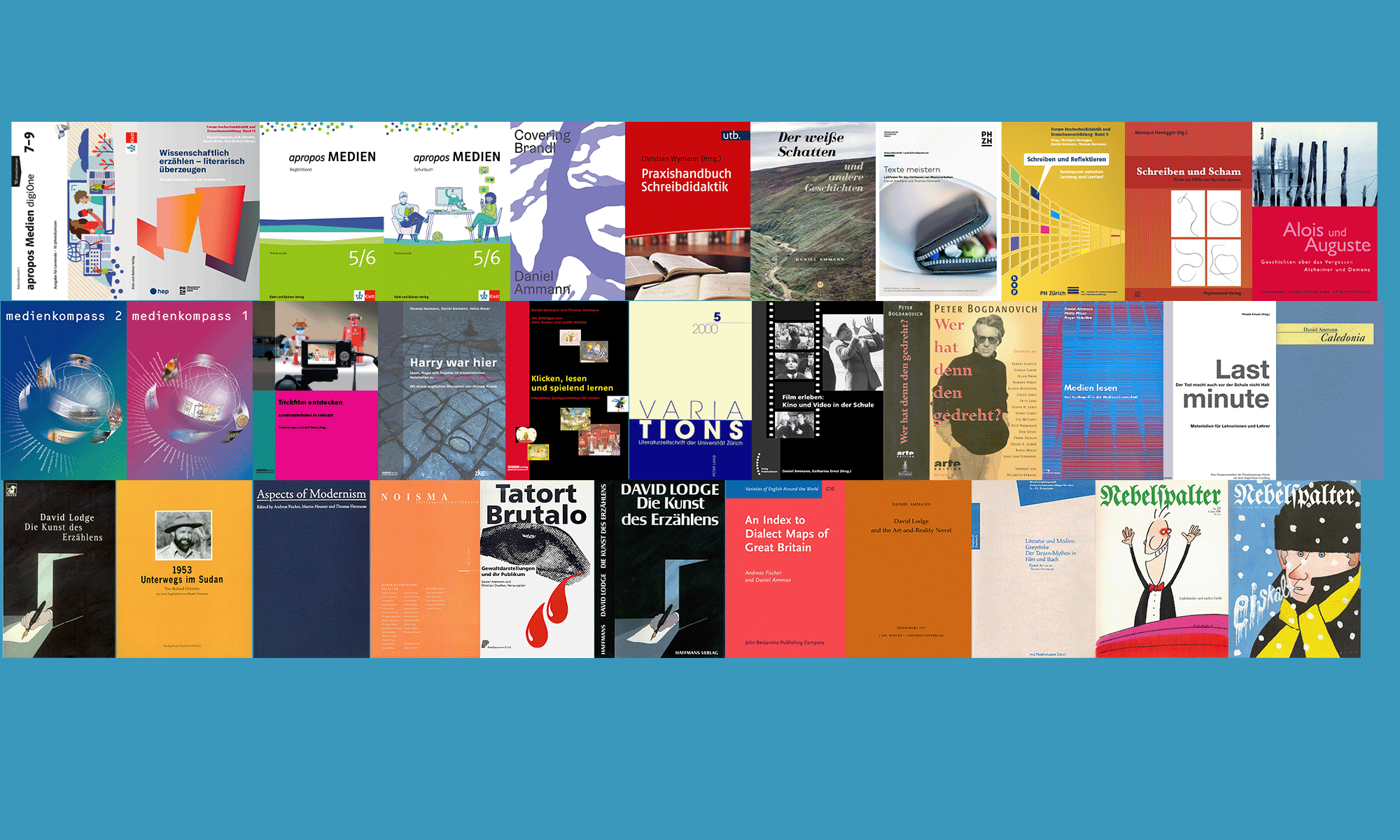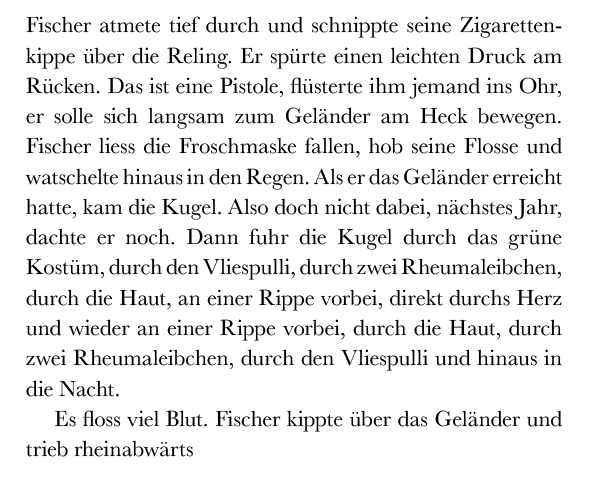
Screenshot aus Heidi (Alain Gsponer 2015)
Beim Lesen ist mir immer mal wieder aufgefallen, wie da und dort die Staubpartikel im Sonnenlicht tanzen. Ein vertrautes Bild, das durch die häufige Verwendung seine Originalität, aber nicht seinen Reiz eingebüsst hat. Hier eine Auswahl meiner Fundstücke:
«Streifen und Flecken von Sonnenlicht, das durch ein Fenster weiter oben fiel, ein Dachfenster womöglich, spielten auf dem rotbraunen Gewebe unter ihren Füssen, auf der abgetretenen Stelle oben an der Treppe, auf dem polierten Geländer, auf den Staubkörnchen in der Luft.»
– Graham Swift, Ein Festtag
«Ein Sonnenstrahl drang durch die vergitterte Milchglasscheibe und verwandelte die Staubkörner in Tänzer, die sich im Zeitlupentempo bewegten.»
– Ian Rankin, Das zweite Zeichen
«Es war kalt im Zimmer, aber durch die Vorhänge drang Sonnenlicht, in dem ein Universum aus Staubpartikeln glitzerte, sachte bewegt vom Luftzug, der durch das undichte Fenster wehte.»
– Rolf Lappert, Nach Hause schwimmen
«[…] das Tageslicht liess den Linoleumboden bei Sonnenschein schwach schimmern und Tausende Staubpartikel in der Luft aufleuchten wie eine Miniaturausgabe der Milchstrasse.»
– Karl Ove Knausgård, Spielen
«Ihr Gesicht, das Gesicht einer Heiligen, einer Wiking-Madonna, bezog seinen Glanz von den roten Lampions in der Pinie und schimmerte sanft durch die flimmernden Staubpartikel hindurch, die im Kerzenlicht schwebten.»
– F. Scott Fitzgerald, Zärtlich ist die Nacht
«[…] und als ich die Sonnenvierecke auf dem Parkettboden sah, spitzwinklig verzerrt, und darüber die im Licht tänzelnden Staubpartikel, konnte ich in der plötzlichen Verlorenheit nicht anders […]»
– Norbert Gstrein, Das Handwerk des Tötens
«Dort, wo die tiefstehende Sonne wie der Lichtkegel eines Theaterscheinwerfers durch die Fenster strahlte, tanzten Staubpartikel. Wenn man in die Hände klatschte, stoben sie für einen Moment auseinander, als ob das Geräusch sie erschreckt hätte.»
– Charles Lewinsky, Gerron
«Obwohl das Patientenzimmer regelmässig gelüftet und gereinigt wurde, tanzten feinste Staubpartikel in der Luft und gaben dem Kegel der Sonnenstrahlen die Konturen eines Bühnenscheinwerfers.»
– Sebatian Fitzek, Splitter
«Die Hitze war nach wie vor erdrückend, und die Staubpartikel stiegen auf und glitzerten wie Sterne im Sonnenlicht, das schräg durch die Schlitze im Spielzelt einfiel.»
– John Irving, Zirkuskind
«Feine Staubpartikel flirrten in den lotrechten, messerscharf konturierten Lichtsäulen, die das Zimmer mit Helligkeit erfüllten.»
– Haruki Murakami, Tanz mit dem Schafsmann
«Das Licht, das in einem schrägen Winkel durch die Schaufenster fiel, umspielte ihre Taille und schimmerte auf den Schienbeinen unter ihrem Rocksaum. Er konnte die winzigen Staubpartikel sehen, die zwischen ihren Fussknöcheln in der Luft schwebten, und da war etwas zutiefst Vertrautes in dem fliessenden Muster, das sie dabei bildeten.»
– Anthony Doerr, Winklers Traum vom Wasser
«Durch die Ritzen zwischen den Wandbrettern und im Dach fiel das Sonnenlicht, der ganze Raum war durchzogen von schmalen, staubflirrenden Lichtstreifen.»
– Robert Seethaler, Jetzt wirds ernst
«Sobald eine Staubfahne aus dem Sonnenlicht hinausschwebte, erloschen die Staubteile wie winzige Sterne. Und leuchteten wieder frisch auf, sobald sie einen neuen Sonnenstrahl durchquerten.» – Wilhelm Genazino, Eine Frau, eine Wohnung, ein Roman
«Die Tür zur Schankstube öffnet sich, Licht dringt herein. In dem hellgelben Strahl tanzen Staubkörner.»
– Ursula Poznanski, Erebos
«In den zinnfarbenen Lichtstrahlen, die durch das Ostfenster schräg auf den Altar fielen und in der mittleren Bankreihe verschwanden, tanzten Staubkörner.» – Dennis Lehane, Absender unbekannt
«Die Luft hier drinnen war abgestanden. Staubkörner tanzten in Siebens Glimmen wie ein feiner Nebel und meine Schritte hallten laut durch die Stille.»
– Mechthild Gläser, Stadt aus Trug und Schatten
«Auf dem Treppenabsatz, zwischen den Stockwerken, versucht das schräg hereinfallende Sonnenlicht, ihn aufzuhalten, schneidet seine Beine ab, helle gebogene Streifen, die vor ihm die Stufen rauffallen, Staubkörner, die wie Fische in einem Aquarium durch die Luft treiben.»
– Stewart O’Nan, Halloween
«– einen Moment lang verwandelte sie sich in eine Gestalt aus einer BBC-Sendung, wie sie im langen Kleid einen Feldweg entlangschritt und im Sonnenlicht Mücken und Staubkörner ihr Haar umtanzten.»
– Anne Enright, Das Familientraffen
«Zitternd saß er im Heu und verfolgte mit finsteren Blicken die Staubkörner, die in dem Sonnenstrahl umherwirbelten.»
– Astrid Lindgren, Rasmus und der Landstreicher
«Durch das Fenster am Ende des Gangs, dessen schmierige Scheiben nach einer gründlichen Reinigung verlangten, fiel das Licht des sich neigenden Tages. Es war ein sterbender Glanz von kupferner Färbung, ein samtener, beinahe ängstlicher Schimmer, der die in der Luft tanzenden Staubkörnchen wie gläserne Insekten aussehen liess. Obwohl sie vielleicht besser mit einem Pollenregen verglichen würden, wie sie so zögernd und ziellos durch die Luft trieben.»
– Félix J. Palma, Die Landkarte der Zeit
«Tanzende Partikel von Sonnenlicht drangen hindurch.»
– John Updike, Witwen
«Als ich mich auf ein grell orangefarbenes Sofa fallen liess, stieg eine Staubwolke auf, in der sich die durch das Fenster dringenden Sonnenstrahlen fingen.»
– Cory Doctorow, Upload
«Sie kam unter der Brücke hervor, lief durch einen staubigen Keil Morgensonne, und der Zug verschwand in der Ferne mit einem harmlos klickenden, vorstädtischen Geräusch.»
– Ian McEwan, Abbitte




 Nach längerer Pause ist wieder ein
Nach längerer Pause ist wieder ein 




